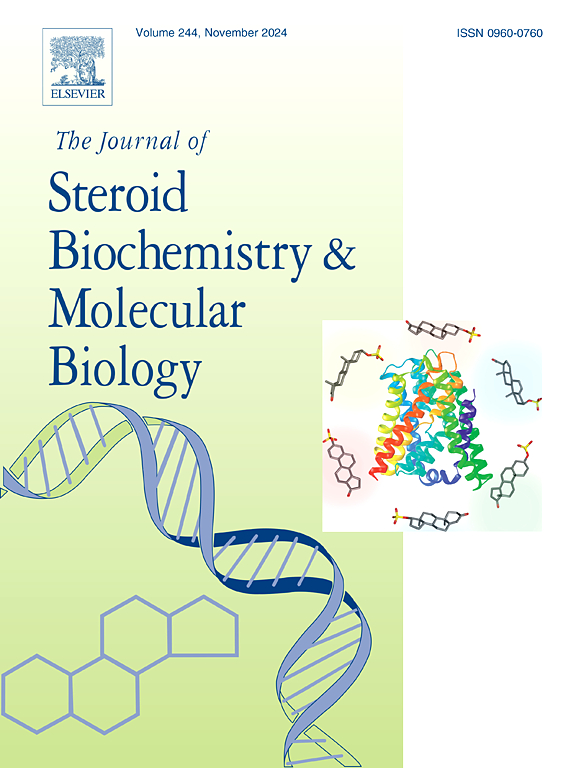Nano-curcumin attenuates tamoxifen resistance and malignant progression in ER-positive breast cancer cells by inhibiting the PI3K/AKT/mTOR signaling pathway
IF 2.5
2区 生物学
Q3 BIOCHEMISTRY & MOLECULAR BIOLOGY
Journal of Steroid Biochemistry and Molecular Biology
Pub Date : 2025-07-03
DOI:10.1016/j.jsbmb.2025.106825
引用次数: 0
Abstract
Breast cancer (BC) is one of the most prevalent malignant tumors among women, with estrogen receptor (ER)-positive patients constituting approximately 70 % of all cases. Endocrine therapy is currently a treatment option for patients with ER-positive BC; however, the development of resistance significantly limits the effectiveness of this treatment. Nano-curcumin (Nano-CUR) possesses anticancer properties and enhances bioavailability by improving the hydrophobic character of curcumin (CUR). However, the underlying mechanism by which Nano-CUR affects tamoxifen (TAM) resistance in ER-positive BC remains unknown. Here, we found that Nano-CUR promoted apoptosis and cell cycle arrest, inhibited cell proliferation and reduced the levels of cancer stem cells (CSCs)-related markers, including octamer-binding protein (OCT4), Nanog homeobox (NANOG) and sex-determining region Y-box 2 (SOX2) in TAM-resistant BC cells. Additionally, Nano-CUR demonstrated the ability to inhibit tumor malignant progression in TAM-treated BC mice. Mechanistically, Nano-CUR blocked the activation of the phosphatidylinositol 3-kinase (PI3K)/protein kinase B (AKT)/mammalian target of rapamycin (mTOR) pathway in MCF-7/TAM and T47D/TAM cells. The activation of this pathway by its activators (PI3K activator 740Y-P, AKT activator SC-79, and mTOR activator MHY1485) effectively alleviated the anti-tumor effect induced by Nano-CUR in TAM-resistant BC cells. Collectively, these findings reveal that Nano-CUR contributes to the reduction of tumorigenesis and TAM resistance in ER-positive BC cells by inhibiting the PI3K/AKT/mTOR signaling pathway.
纳米姜黄素通过抑制PI3K/AKT/mTOR信号通路减弱er阳性乳腺癌细胞对他莫昔芬的耐药性和恶性进展。
乳腺癌(BC)是女性中最常见的恶性肿瘤之一,雌激素受体(ER)阳性患者约占所有病例的70%。内分泌治疗是目前er阳性BC患者的一种治疗选择;然而,耐药性的发展极大地限制了这种治疗的有效性。纳米姜黄素(nanocurcumin, Nano-CUR)通过改善姜黄素(curcumin, CUR)的疏水性来提高生物利用度,并具有抗癌特性。然而,Nano-CUR影响er阳性BC中他莫昔芬(TAM)耐药性的潜在机制尚不清楚。在这里,我们发现Nano-CUR促进细胞凋亡和细胞周期阻滞,抑制细胞增殖,降低癌症干细胞(CSCs)相关标志物的水平,包括抗tam BC细胞中的八聚体结合蛋白(OCT4), Nanog同源盒(Nanog)和性别决定区Y-box 2 (SOX2)。此外,Nano-CUR在tam治疗的BC小鼠中显示出抑制肿瘤恶性进展的能力。在机制上,Nano-CUR阻断了MCF-7/TAM和T47D/TAM细胞中磷脂酰肌醇3-激酶(PI3K)/蛋白激酶B (AKT)/哺乳动物雷帕霉素靶蛋白(mTOR)通路的激活。该通路的激活剂(PI3K激活剂740Y-P、AKT激活剂SC-79和mTOR激活剂MHY1485)可有效缓解Nano-CUR对tam耐药BC细胞的抗肿瘤作用。综上所述,这些发现表明Nano-CUR通过抑制PI3K/AKT/mTOR信号通路,有助于减少er阳性BC细胞的肿瘤发生和TAM耐药性。
本文章由计算机程序翻译,如有差异,请以英文原文为准。
求助全文
约1分钟内获得全文
求助全文
来源期刊
CiteScore
8.60
自引率
2.40%
发文量
113
审稿时长
46 days
期刊介绍:
The Journal of Steroid Biochemistry and Molecular Biology is devoted to new experimental and theoretical developments in areas related to steroids including vitamin D, lipids and their metabolomics. The Journal publishes a variety of contributions, including original articles, general and focused reviews, and rapid communications (brief articles of particular interest and clear novelty). Selected cutting-edge topics will be addressed in Special Issues managed by Guest Editors. Special Issues will contain both commissioned reviews and original research papers to provide comprehensive coverage of specific topics, and all submissions will undergo rigorous peer-review prior to publication.

 求助内容:
求助内容: 应助结果提醒方式:
应助结果提醒方式:


